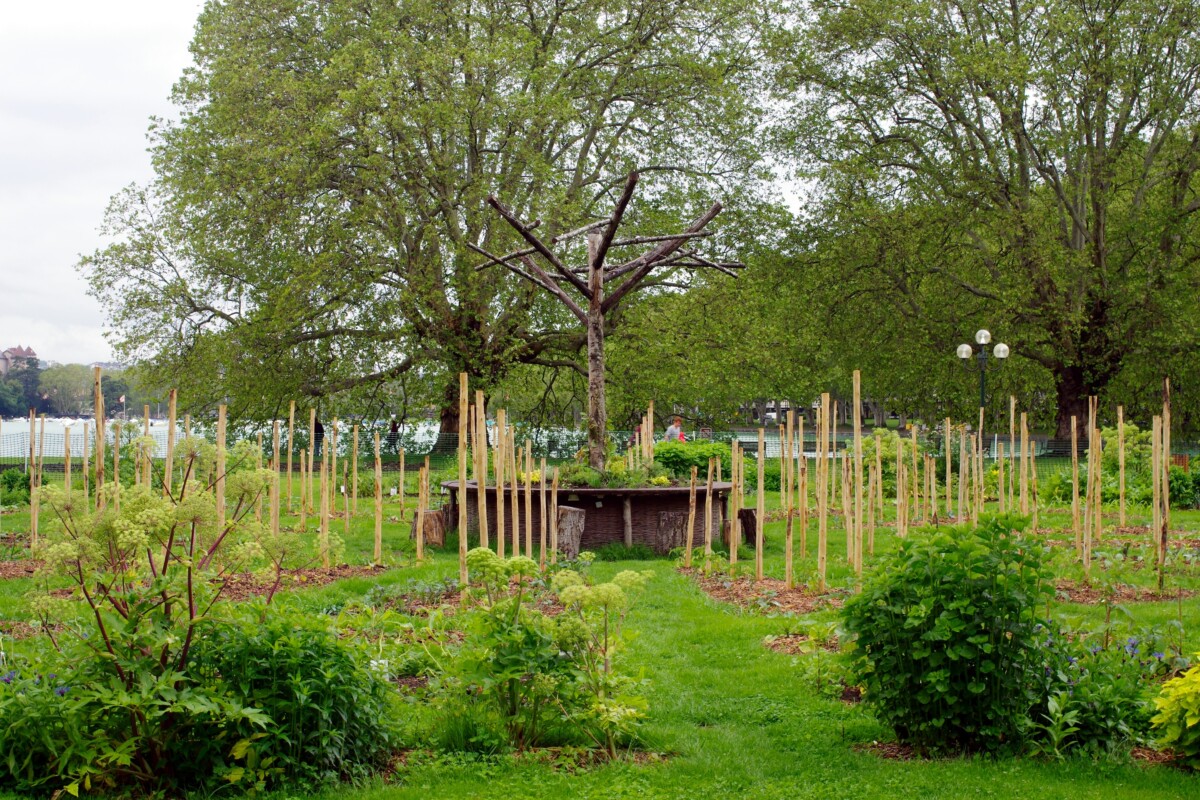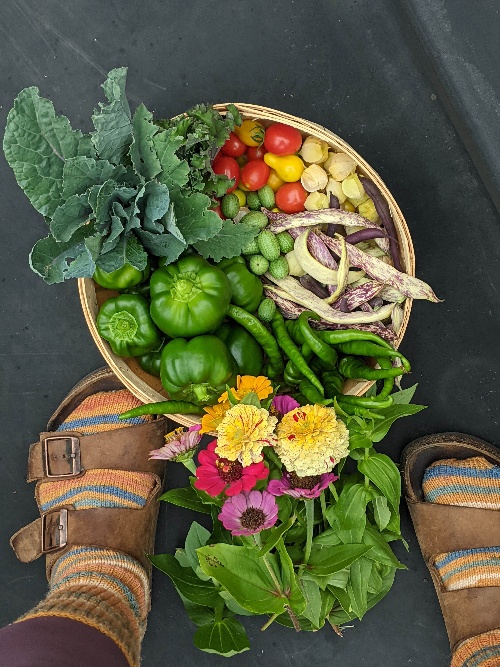
The end of gardening season can be a time for contemplation and indoor tasks. You may find yourself with more time to focus on the educational aspects of growing plants. This makes fall and winter the perfect time to take an online permaculture course.
What is Permaculture?
Permaculture—a combination of the words “permanent” and “agriculture” is a principled approach to growing plants. The aim is to create as many closed-loop systems as possible. Permaculture gardens support their own nutritional needs and benefit more species than the humans that planted them.

The idea is to create self-sustaining systems that leave the planet in slightly better health every year. In other words, you want your gardens to work with nature rather than against it.
Though the premise is simple, permaculture has many supporting principles and takes time and experience to master. That’s why many people pursue online permaculture courses as an opportunity to learn from experts at their own pace. You can also try some beginner-friendly projects to dip your toes in the water.
5 Questions Before Choosing the Best Online Permaculture Course for You

When deciding which is the best online permaculture design course, it’s best to start by asking yourself a few questions. These will help you determine what you are looking for so you can find the class that best suits your needs.
1. Do you want a certification?
Traditional permaculture design courses are 72 hours long and provide you with official certification at the end. This is valuable for anyone attempting to gain credibility within the industry or go into a permaculture business. Still, it may be overkill for someone who merely wants to improve their yard.
2. What’s your timeframe?
Some permaculture courses dive deep with lots of content quickly, while others are set up to offer you a short weekly lesson over a year. Decide whether you want to immerse yourself in permaculture content for a few weeks, or take in the information more slowly over time.
3. Which is better, learning theory or actionable steps?
Permaculture courses differ in their overall takeaways. Some focus on theory and the big picture, while others are built around DIY projects you can jump into at home. Decide what you want to prioritize, and things will go more smoothly.
4. What are your specific interests?
Many online permaculture courses niche themselves. Some are focused on making an urban backyard more environmentally friendly, while others will help serious organic farmers increase their yields.
Many instructors put their own spin on the material by focusing permaculture ethics in directions like social justice or personal wellness. You might find that a better fit for your interests.
5. Do you resonate with the instructor?
Everyone teaches slightly differently, and the wrong instructor can wreck your permaculture course experience. If a free intro video is available, consider watching it to see whether you resonate with the instructor.
7 Top Online Permaculture Courses

Though there’s no discounting the benefits of hands-on experience, you can learn plenty from an online permaculture course. Consider one of these options to start the learning process virtually.
A quick note: prices are not posted in this article as these change over time. You can research prices via the links provided.
1. Free Permaculture
Taught by Heather Jo Flores, the Free Permaculture series lives up to its name with free access to a range of permaculture content.
You can choose from an assortment of mini-courses, join the online forums, or sign up for a year-long, 52-lesson class designed to give you a holistic understanding of permaculture.
Best for: Anyone interested in permaculture that doesn’t feel ready to commit to more intensive study.
2. Permaculture Women’s Guild
Another course offering from Heather Jo Flores, the Permaculture Women’s Guild provides a double-certification permaculture design course that’s taught by more than 40 women from around the world. This course includes more than forty multimedia classes and one-on-one mentorship opportunities with experts in the field.
You can follow the course at your own pace and take up to a year if desired.
Beyond the design certification course, the Permaculture Women’s Guild offers many others, including the following.
- Design Your Inner Landscape: Learn how to use permaculture principles to overcome procrastination, burnout, and imposter syndrome, and learn to support your own self-care needs.
- Permaculture Women Writers: Connect with nature through writing with a three-week course that lets you meet with other writers, develop a daily writing habit, and discover publishing opportunities .
Best for: Female organic gardeners, community activists, and artists, and designers who want to apply ecological principles to their work.
3. Sustainable Agriculture Institute
Experience the benefits of a fully online permaculture design course in partnership with the Rak Tamachat Permaculture Institute in Thailand. The course is taught by Beau Wickboldt and provides more than 80 hours of material, including 52 hours of original content.
You can try the first lesson free before committing, and it comes with bonus content related to mushroom cultivation, animal husbandry, and homesteading principles.
It’s also possible to earn other certifications from the Sustainable Agriculture Institute, including an online permaculture diploma and an online Masters of Permaculture Design, M.P.Des (cost varies).
Best for: Anyone who wants permaculture design certification with a tropical climate focus.
4. The Permaculture Circle
Geoff Lawton is a world-renowned permaculture teacher and designer. His newest platform, The Permaculture Circle, is a free resource that builds on the ideas of Bill Mollison (Lawton’s original teacher) for modern permaculture design.
You’ll gain access to more than 100 videos, a nine-part mini permaculture course, and a weekly newsletter that connects you with the greater permaculture community.
Best for: Those who want to join a free online community of other permaculture enthusiasts.
5. High Sierra Permaculture
Founded by Bret James, High Sierra Permaculture will teach you the basic principles of permaculture virtually. James has more than a thousand hours of in-field experience and two courses available.
- The Permaculture Homesteading Crash Course: Learn how to grow food while tending to the environment (free).
- Find the Perfect Homestead Property: Learn how to choose the right piece of land through permaculture tools, so you don’t live with regret or spend thousands correcting unexpected problems ($47).
Best for: Those property shopping or in the beginning stages of transitioning to a permaculture-friendly lifestyle.
6. Permaculture Visions
Permaculture Visions differentiates itself from other virtual learning opportunities by focusing on one-on-one mentorship in a virtual setting.
You can choose between an Introduction to Permaculture Course or sign up for the certified Full Permaculture Design Course. The Design Course consists of 20 topics. You have up to two years to complete everything once you sign up.
Best for: Those who want the feeling of a small group setting in a virtual format.
7. Permaculture Rising
Offered by Oregon State University, the Permaculture Rising Design Course for ten weeks of content (start dates are staggered throughout the year). This means that you will take the course simultaneously with others around the world and will receive an official certification at completion.
All participants will interact with each other through the program’s blog and by sharing and viewing each other’s designs.
The University offers other sustainability-focused online courses as well, including Permaculture Food Forests and Rainwater Harvesting. New courses are added throughout the year.
Best for: Those who want to engage with permaculture peers and follow a set course schedule.
Other Ways to Expand Your Permaculture Education
If you’re not ready to commit to a fully online course for learning about permaculture, then books may prove to be the perfect resource. Here are some of the most notable titles within the field to get you started.

Introduction to Permaculture by Bill Mollison
Considered to be the father of the permaculture movement, Bill Mollison wrote several books dedicated to its theory and practice. This introductory book breaks down the principles for beginners without compromising on its original intent.

Gaia’s Garden: A Guide to Home-Scale Permaculture by Toby Hemenway
Learn how to apply permaculture principles directly to your garden through this resource book that breaks down the movement’s sweeping themes for your own backyard.

The Resilient Farm and Homestead: An Innovative Permaculture and Whole Systems Design Approach by Ben Falk
Improve the efficiency and environmental sustainability of your homestead or small farm by adapting permaculture principles meant for that scale. The book relies on the strategies Falk honed as a land designer and site developer before using them to create a national-recognized permaculture farm.

Permaculture Design: A Step-by-Step Guide by Aranya
For those who want actionable takeaways, this book is the perfect permaculture teacher. You’ll learn how to implement the movement’s principles right away for tangible impacts on your property right away.

Get the famous Rural Sprout newsletter delivered to your inbox.
Join the 50,000+ gardeners who get timely gardening tutorials, tips and tasks delivered direct to their inbox.

